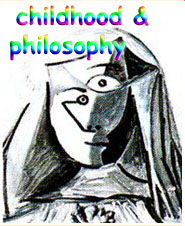why piaget does not philosophize? critical discussion of gareth b. mathews with the piagetan concept of cognitive development
DOI:
https://doi.org/10.12957/childphilo.2019.39320Keywords:
children's philosophy, cognitive development, Piaget's theory, Gareth B. Matthews, philosophy of childhoodAbstract
TThis article analyzes the critique of the Piagetan theory of intellectual development made by American philosopher Gareth B. Matthews (1929-2011). Matthews analyzes Piaget's ideas from the perspective of the meaning and possibility of philosophizing among children. His use of Piaget is particularly relevant today because the theory of cognitive development has shaped modern education and contributes to the preservation of skepticism about children's philosophy. The article reconstructs and interprets Matthews' arguments, which consistently and systematically show that Piaget misunderstood children's philosophy. By “child’s philosophizing,” Matthews refers to children's tendency to ask philosophically significant questions, their ability to problematize experience, their specific attitude toward the world, and their ability to sense the problems that great philosophers have been dealing with for centuries. Piaget interpreted all these observable features of children's thinking as intellectual deficits; Matthews argues against this interpretation. The discussion focuses on the problem of determining the criterion of intellectual maturity, the importance of creativity and fantasy in thinking, the development of concepts and language skills, and the related differences between children and adults' language use. This analysis of Matthews’ critique of the Piagetian theory of cognitive development concludes that child psychology needs to be more open to this aspect of children's thought and that psychologists and philosophers must seek to better understand the child's philosophizing.
Downloads
References
GEACH, P. Mental acts, New York: Bloomsbury Publishing Plc, 1971
MATTHEWS, G.B. Dialogues with Children, Cambridge, Massachusetts and London: Harvard University Press, 1984
MATTHEWS, G.B. Philosophy & the Young Child, Cambridge, Massachusetts and London: Harvard University Press, 1980
MATTHEWS, G.B. The idea of conceptual development in Piaget. Synthese, vol. 65 (1985), pp. 87-97, 1985
MATTHEWS, G.B. The Philosophy of Childhood, Cambridge, Massachusetts and London: Harvard University Press, 1994
PIAGET, J. The Child's Conception of the World, London: Routledge & Kegan Paul Ltd, 1929.
PIAGET, J. Children’s Philosophies. in: MURCHISON, C. (ed.), A Handbook of Child Psychology, 2nd edition, Worcester, MA: Clark University Press, pp. 534-547, 1933
PIAGET, J., INHELDER, B. The child’s Construction of Quantities: Conservation and Atomism, London: Routledge & Kegan Paul Ltd, 1974




